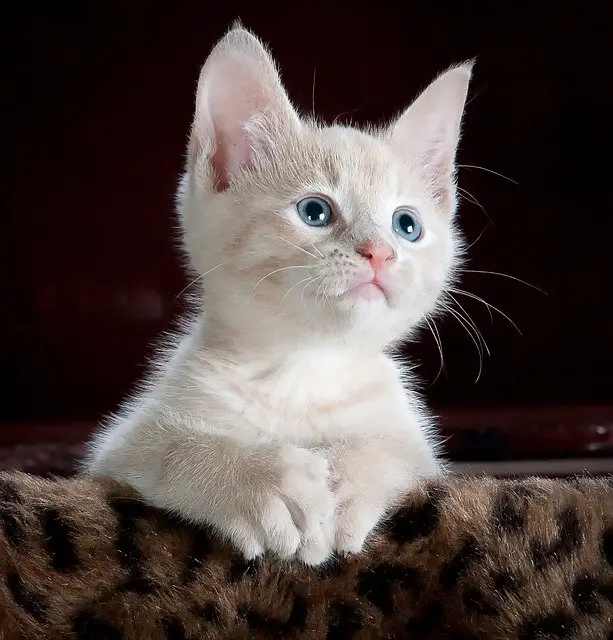Newly-adopted kittens can act overly attached to their owners for numerous reasons. They might be insecure, especially if they are rescue kittens. Furthermore, they
could be:
● imprinting on you
● developing an insecure attachment
● feeling safe with you
● weaned too early
● having medical issues
Is the Attachment Normal or Something to Be Concerned About?
After I adopted Fuzz, it didn’t take a lot of time for him to warm up to me. In fact, it wasn’t
long before I realized that my kitten is very attached to me.
He goes wherever I go. What’s more, he became my personal alarm clock. Every morning
around six, he snuggles close and paws at my face to get my attention. He’s not after food.
He simply wants my affection.
When I go out, Fuzz puts up a fight — he wants to go with me. He also meows a lot. If I’m
doing something, he’ll simply make noise until I pay attention to him.
Here’s the thing — I’ve always had plenty of cats around me. However, I’ve never actually
been a proud momma of a kitten before Fuzz. Therefore, I didn’t know if his attachment was
normal or something I should worry about.
Do overly-attached kittens grow out of it and become independent cats? Will I always have a
kitten ankle bracelet? Questions like these worried me, and I couldn’t in good conscience let
my little furry friend act like I’m his new favorite thing in the world without doing a bit of
research first. I had to know if that particular behavior was good for him (and me) or not.
My Kitten Is Very Attached to Me — Why?
Kitten behavior can vary quite a bit. Some kittens are skittish and act aloof, while others cling
to their humans like they are their lifeline. In a way, we are, but I’ll talk more about that a bit
later.
Kittens getting overly clingy with their owners is not something unusual. But I wanted to
know why it happens. Should I encourage it? Or should I try to make Fuzz be more
independent?
So, here’s my reality — my kitten is very attached to me, and I’d like to know why that is and
what to do about it. Let’s unpack this, shall we?
Rescue Kittens
Rescue cats rarely have happy stories. Well, the stories have a happy ending, sure, but we
must think about how a rescue kitten came to be. What were the circumstances of its birth,
and what were the kitten’s early days like? It’s anyone’s guess, but the answer is usually
“traumatic.”
Therefore, there’s a good chance that the kitten is simply grateful for the rescue. Not in the
human sense of the word, of course. But, rescue kitties know that their lives changed after
we became a part of them. We are dubbed as rescuers in their eyes, and their attachment is
a reflection of their gratitude.
Rescue cats usually have trust issues. They are insecure and unsure of their future. They
don’t trust easily, but when they do, they’ll cling to their person with everything they have.
Although Fuzz wasn’t a rescue, I could see some of that insecurity in him. Therefore, I had to
consider that he was potentially developing an insecure attachment.
Developing an Insecure Attachment
It’s perfectly normal for cats to get clingy with the humans in their household. Every cat
owner knows that a cat’s love is a hard thing to get. Once we do get it, though, we have it for
life.
That’s because cats get attached to humans just like we do to them. The problem arises
when that attachment is insecure in nature.
Kittens and cats that develop a secure attachment to their owners know that their owners are
a solid presence in their lives. Thus, they know where they can get safety, protection, and
love from, and they know who will always provide them with everything they need.
Kittens that develop an insecure attachment are what we call “clingy cats.” They aren’t
secure in our presence in their lives, so they cling to us to stop us from abandoning them.
Rescue kittens and kittens that are naturally anxious often form this type of attachment to
their owners. They are still too young to know from experience that we’ll definitely be there in
the morning and provide for them for the rest of their lives. So, they cling.
Kittens That Were Weaned Too Early…
Sometimes a cruel twist of fate (or an over-eager breeder) separates the kittens from their
mothers too early. Foster homes and shelters hand-feed kittens that are only a day or two
old, and that haven’t had any contact with their mothers. That is a sad set of circumstances
and a lousy way to start life.
So, what happens when the kitten loses its mommy? It finds a new one. Or, better put, it
imprints on one.
Usually, End Up Imprinting on Their Owners
A young kitten without its mother and littermates will often become overly affectionate to the
person that’s caring for it. That’s imprinting, and it happens to a lot of baby animals that form
bonds with humans.
Kittens see us as a parental figure. We are the people they learn their behavior and take
cues from. After all, there’s no one else around who’ll show them how to properly cat.
With a relationship like that, we can’t really blame them for the imprinting that results in an
overly-attached kitten. So, all of us wailing My kitten is very attached to me! need to realize
that we’ve basically taken on the role of a parent, and we need to act like it.
Of course, that doesn’t mean we should just leave things be. Socializing kittens is vital for
healthy development. Therefore, we should do our best to expose our fluffy youngsters to
other kittens and cats, so they have someone else to learn things from.
Safety, Protection, and Providing For Them
Kittens are generally curious but unsure of their abilities. That’s why they crave safety. Of
course, humans provide that for them (as well as a lot of other things).
Everything the kitten sees in the world and every experience it has is new. We are the ones
who are helping the kitten navigate that. We are guiding it and are there to protect it from
everything negative (like aggressive dogs, loud noises, etc.). What’s more, we also provide it
with food and a safe environment.
So it’s safe to say that we are the kitten’s safety blanket. As much as I’d like to say that all
kittens appreciate this and love us for it, the reality might be different.
The kitten might not know much, but it knows that it wants to survive. The survival instinct is
one of the strongest ones in all creatures — it’s the driving force that keeps most beings
going. So, kittens see us as their best chance at survival and, therefore, cling to us as if they
are clinging for dear life (which they are).
Medical Issues
Overly-attached kittens can be simply trying to communicate with us. It’s not that they
necessarily want to cling to us as much as they feel as though they need to. Certain medical
issues, such as seizures and epilepsy, can cause a kitten (or an adult cat) to be overly
attached.
So, as cute as the attachment may be, it’s best that we check in with a vet to make sure that
there isn’t a serious cause behind it.
My Kitten Is Very Attached to Me, What Should I Do About It?
Once we determine the cause of our kittens’ attachment, we should do something about it.
After all, we can’t go about our days with permanent kitten ornaments, right?
So, after thorough research, I found myself in this exact spot — my kitten is very attached to
me, and it’s bothering me and halting his development. Is there anything I can do to change
that behavior?
The answer was, of course, yes.
● Mewling for attention — kittens often make noises to attract our attention. The kicker
here is that we shouldn’t give it to them. If we want to stop incessant mewling that
happens for no legitimate reason, we shouldn’t reward it. Instead, we should teach
our kittens to the only mewl when they need something (like food or water).
● Constantly following you — clingy kittens will want to be with their owners all the
time. That is highly inconvenient but, more importantly, also unhealthy. Therefore, we
also shouldn’t reward such behavior. If we have an overly-clingy kitten, we should
teach it to spend time without us.
When Fuzz attacks my ankles and clings to them, I distract him with a dangling toy.
Then, I make my escape while he’s busy trying to destroy it. If I’m leaving for more
than a few hours, I usually prepare Fuzz’s toys in one spot, so he has something to
occupy his time with, and I leave him with one of my shirts in his bed.
A Few Parting Words
Clingy kittens make us feel amazing. They love us and need us to survive. We’re the best
person in their eyes!
Yes, but clinginess isn’t always such a positive thing. As I mentioned, it didn’t take me long
to notice that my kitten is very attached to me and that I should do something about it. I did
my research and am more than happy to share it with everyone.
However, the best thing we can do for our kitties is to consult a professional. Overly-attached kittens are adorable (or
annoying, depending on the situation), but their attachment can also be a sign of trouble.
[su_box title=”Affiliate Disclosure”]This website is supported by its readers. Please assume that all links are affiliate links. If you make a purchase from one of the links we will make a commission from Amazon. Thank you.[/su_box]





